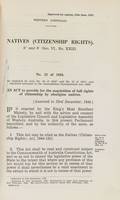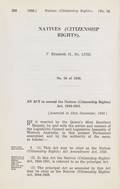The 'dog collar' acts
In order to escape the restrictions of these state laws, people who were defined as Aboriginal had to apply for an exemption. Many referred to these laws as the 'dog collar act' or 'the dog act' as people felt they were being pushed and pulled as if they were a dog on a lead. Those who applied for exemption often lost credibility in the eyes of their friends and family. They were seen to be ingratiating themselves with the authorities who made unreasonable demands, such as refraining from socialising with kin. Once exempted, a person was often no longer considered to be 'an Aborigine' - it was impossible to be both an Australian citizen and an Aboriginal person.
Western Australia Natives (Citizenship Rights) Act 1944
Western Australia, Government Gazette, 29 February 1952.
More info on Western Australia Natives (Citizenship Rights) Act 1944
Western Australia Natives (Citizenship Rights) Amendment Act 1958
Western Australia, Government Gazette
More info on Western Australia Natives (Citizenship Rights) Amendment Act 1958
The Northern Territory was the only jurisdiction (apart from the Australian Capital Territory) in which the Commonwealth had direct power. Paul Hasluck, the Minister for Territories, argued that the barriers to full citizenship were not to do with race. He believed that people could learn to become Australian citizens and that limitations on this citizenship should be based not on race but on the ability of a person to make his or her way in white Australian society. This included the ability to manage money, to work and to gain a basic education. Thus the Northern Territory Welfare Ordinance, which became law in 1957, made no direct reference to race; instead it referred to those who 'by reason of their manner of living' were regarded as being unable to manage their own affairs and would thus be declared wards of the state.
When members of the Northern Territory Legislative Council realised, however, that it would be possible to apply the criteria to a person who was not Aboriginal, further criteria were added so that Aboriginal Territorians were the only ones who could be declared wards under this legislation. A person could not be declared a ward if s/he was entitled to vote at an election of a member of the House of Representatives for the Northern Territory, and if a person was a ward s/he had no entitlement to vote. This sleight of hand protected white Territorians, as administrators intended it to, while appearing to legislate for those people, regardless of race, who demonstrated the need for welfare assistance.
Related resources
383320
- 383300
- 383320
- 383340
- 383368
- 383392
- 383408
- 383428


